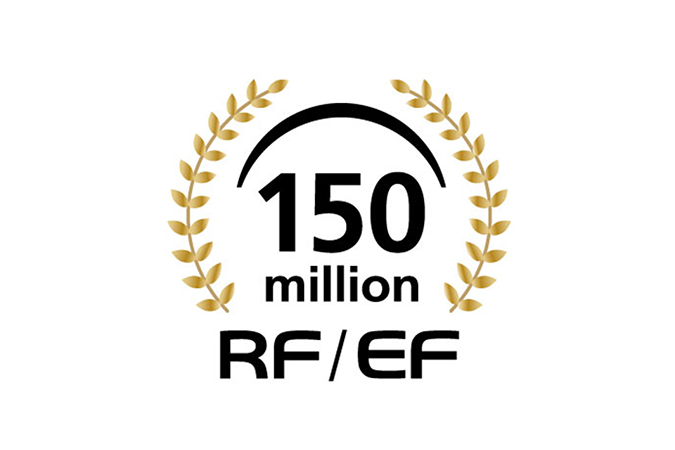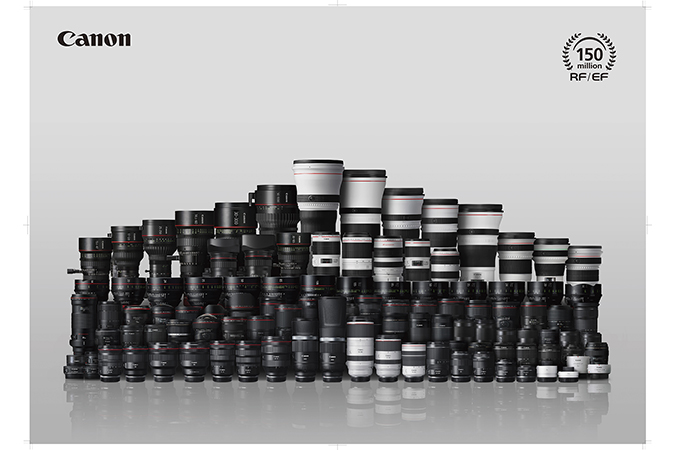

Press Release
Canon Celebrates in Latin America a Significant Milestone with Production of 150 Million Interchangeable RF And EF Lenses
MELVILLE, N.Y., February 9, 2021 – Canon U.S.A., Inc. – Latin America Group, a leader in digital imaging solutions, announced today that its parent company, Canon Inc., reached a new lens-manufacturing milestone with the production in January 2021, of the Company’s 150-millionth RF and EF series interchangeable lens for EOS cameras1— an RF 70-200mm f/2.8L IS USM telephoto zoom lens (released in November 2019).

Production of interchangeable EF lenses for Canon EOS-series AF (Autofocus) single-lens reflex film cameras began in 1987 at the Company’s Utsunomiya Plant. Over the years, EF lenses have gained support from a wide range of users and production has since expanded to a total of four manufacturing bases, including Canon Inc., Taiwan; Canon Opto (Malaysia) Sdn. Bhd.; and Oita Canon Inc. in southern Japan.
EF lens production passed the 10-million-unit mark in 1995 and crossed the 50-million-unit threshold in 2009. In April 2014, the Company celebrated its first-in-the-world achievement of having manufactured 100 million interchangeable lenses, and now, setting a new world record for the most interchangeable lenses produced, Canon manufactured its 150-millionth RF and EF lens in January 2021. Laid end-to-end2, all of the RF and EF lenses Canon has manufactured thus far would measure approximately 7,736 miles in length — nearly equivalent to the Earth’s diameter, which measures approximately 7,917 miles.

Canon’s proprietary EF lenses, launched in March 1987 along with the EOS SLR camera system, have continued to evolve since their introduction, leading the industry through the incorporation of a wide range of innovative technologies, including such world’s firsts3 as the Ultrasonic Motor (USM), Image Stabilizer (IS) technology, and a multilayered diffractive optical (DO) element.
In 2018, Canon introduced the EOS R system and the RF series lenses, which pursues new heights of quality under the core concept of “Speed, Comfort and High Image Quality.” Today, the Company’s extensive RF and EF lens series lineup currently comprises a total of 118 models4, expanding the possibilities for image capture. In addition, thanks to the extensive lineup of lenses, Canon has maintained the number one market share for digital interchangeable-lens cameras since 2003 — a total of 17 years5— and in September 2019, the Company celebrated the production of 100 million EOS-series interchangeable-lens cameras.
Canon will continue refining its imaging technologies centered on its RF and EF lens lineup, striving to cater to the varying needs of photographers — from first-time users to advanced amateurs and professionals — while contributing to expanding the photographic and video imaging culture.
|
Model name & Release date |
Main features and technologies |
|
EF 300mm f/2.8L USM6 Nov. 1987 |
World’s first7 use of a lens-based Ultrasonic Motor (USM) |
|
USM technology delivers fast autofocusing thanks to its high torque and responsiveness. By converting ultrasonic vibrations into rotational energy, the technology makes possible quiet, smooth AF drive performance. |
|
|
EF 75-300mm f/4-5.6 IS USM8 Sept. 1995 |
World’s first7 use of Image Stabilizer (IS) technology |
|
Users can see the results of IS technology through the viewfinder. Delivering high precision and stability for superb image stabilization results, this technology expands the possibilities for handheld photography. |
|
|
EF 400mm f/4 DO IS USM9 Dec. 2001 |
World’s first7 use of a diffractive optical (DO) lens element |
|
Diffraction is an optical phenomenon in which light waves bend as they pass around the edges of an object. DO lens elements use this phenomenon to correct for a variety of aberrations by controlling the path that light travels. |
|
|
EF 24mm f/1.4L II USM Dec. 2008 |
World’s first10 use of Subwavelength Structure Coating (SWC) |
|
SWC technology helps to minimize reflections by aligning countless wedge-shaped structures more minute than the wavelength of visible light on the surface of a camera lens. |
|
|
EF 100mm f/2.8L Macro IS USM Oct. 2009 |
World’s first7 use of Hybrid IS, which compensates for both angle camera shake and shift camera shake |
|
Employing an algorithm, Hybrid IS optimally adjusts for camera shake based on information gathered by two sensors located in the lens. By precisely driving the optical correction system, the technology simultaneously corrects for angle and shift camera shake. |
|
|
EF 8-15mm f/4L Fisheye USM July 2011 |
World’s first7 fisheye lens to deliver both 180-degree diagonal angle of view and 180-degree circular fisheye |
|
The EF 8-15mm f/4L Fisheye USM enables the capture of images with dramatic deformations, exaggerated perspectives and extreme depths of field, making possible images that are significantly distorted, similar to what a fish might see were it to look skyward from under the water surface. |
|
|
EF 200-400mm f/4L IS USM Extender 1.4x May 2013 |
World’s first7 super-telephoto zoom lens to employ an internal extender |
|
Featuring a built-in 1.4x extender, the EF 200-400mm f/4L IS USM Extender 1.4x’s zoom range can be expanded with a simple one-touch operation even in locations where users are unable to switch lenses. |
|
|
EF 11-24mm f/4L USM Feb. 2015 |
World’s first7 lens offering ultra-wide-angle 11 mm minimum focal length |
|
In addition to achieving the world’s widest angle of view starting at a minimum focal length of 11 mm, the EF 11-24mm f/4L USM effectively corrects for aberrations commonly associated with ultra-wide-angle lenses, delivering superb image-quality performance. |
|
|
RF 28-70mm f/2L USM Dec. 2018 |
World’s first11 standard zoom lens to deliver f/2 aperture across the entire zoom range |
|
Employs a large internal mount diameter and a short back focus to realize an f/2 aperture across the entire zoom range, a feat which was considerably difficult for EF series lenses. |
To learn more about the RF and EF lenses, please visit www.cla.canon.com.
For Technical support and assistance, visit us at the following web page: www.cla.canon.com/support.
About Canon U.S.A., Inc.:Canon U.S.A., Inc., is a leading provider of consumer, business-to-business, and industrial digital imaging solutions to the United States and to Latin America and the Caribbean markets. With approximately $33 billion in global revenue, its parent company, Canon Inc. (NYSE:CAJ), ranks third overall in U.S. patents granted in 2019† and is one of Fortune Magazine's World's Most Admired Companies in 2020. Canon U.S.A. is dedicated to its Kyosei philosophy of social and environmental responsibility. To keep apprised of the latest news from Canon U.S.A., Inc. – Latin America Group, sign up for the Company's RSS news feed by visiting www.cla.canon.com/rss. For media inquiries, please contact cla_pr@cla.canon.com.
† Based on weekly patent counts issued by United States Patent and Trademark Office.
Specifications subject to change without notice.
All referenced product names, and other marks, are trademarks of their respective owners.
1. Includes EF, EF-S, RF, EF-M and EF Cinema lenses and lens extenders. As of February 3, 2021.
2. Calculated based the length of the lens’ bodies. Based on Canon research.
3. Among interchangeable SLR camera lenses. Based on Canon research.
4. Includes four lens extenders. As of February 3, 2021.
5. In terms of market share by number of units sold. Based on Canon research.
6. As of February 3, 2021, production for this lens has already been discontinued. Successor: EF 300mm f/2.8L IS II USM (released in August 2011).
7. Among interchangeable SLR camera lenses.
8. As of February 3, 2021, production for this lens has already been discontinued. Successor: EF 70-300mm f/4-5.6 IS II USM (released in December 2016).
9. As of February 3, 2021, production for this lens has already been discontinued. Successor: EF 400 f/4 DO IS II USM (released in November 2014).
10. Among photography lenses.
11. Among interchangeable lenses supporting autofocus across the entire standard zoom range and compatible with 35mm equivalent full-frame sensor cameras.


 Press Releases
Press Releases


